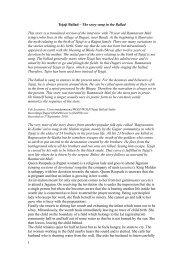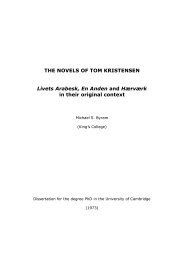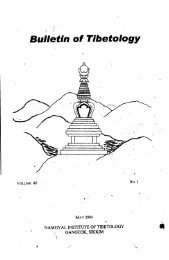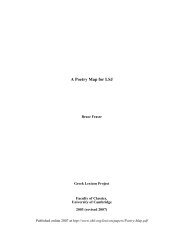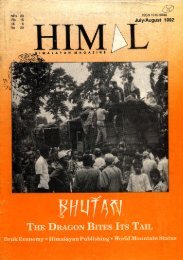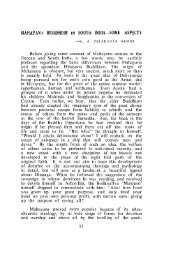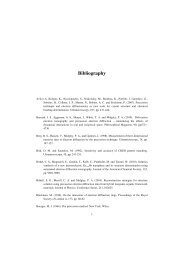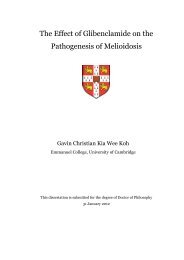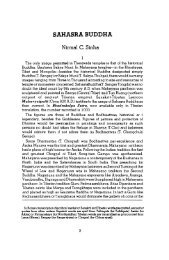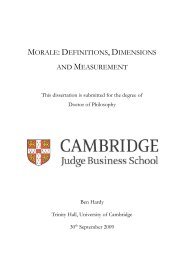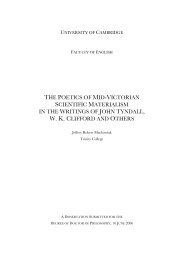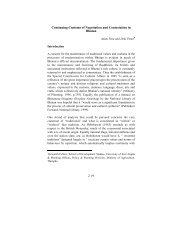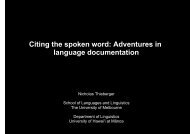The Crusades, the Genoese and the Latin East - DSpace at ...
The Crusades, the Genoese and the Latin East - DSpace at ...
The Crusades, the Genoese and the Latin East - DSpace at ...
You also want an ePaper? Increase the reach of your titles
YUMPU automatically turns print PDFs into web optimized ePapers that Google loves.
et male zelantibus cupidis negoti<strong>at</strong>oribus, ex soliti quaestus diminutione. '79 This st<strong>at</strong>ement<br />
implies th<strong>at</strong> some merchants were playing a double role in this situ<strong>at</strong>ion of famine; some were<br />
saving people from hunger while o<strong>the</strong>rs took advantage of <strong>the</strong> starving people.<br />
It is also interesting to contempl<strong>at</strong>e <strong>the</strong> economic meaning of such an investment in<br />
comparison with <strong>the</strong> export of commodities in peaceful years. <strong>The</strong> Itinerarium twice remarks th<strong>at</strong><br />
<strong>the</strong> price of one measure of whe<strong>at</strong>, which was small enough to be carried under one's arm,<br />
amounted to 100 golden coins: `modii tritici, mensura modica quam videlicet quis facile portaret<br />
sub ascella, centum aureis vendeb<strong>at</strong>ur. ' Ambroise also wrote about <strong>the</strong> lack of supplies <strong>and</strong> <strong>the</strong><br />
high price of whe<strong>at</strong>, which indeed amounted to 100 bezants: `Mull iert li muis de ble pesanz, l<br />
Qui costoit en Post cent besanz. '80 L<strong>at</strong>er on in <strong>the</strong> text. He repe<strong>at</strong>ed this inform<strong>at</strong>ion:<br />
Qui esteit as gerniers gisanz, l<br />
Que cil vendeient cent besanz, /<br />
Sil mist de cent besanz a qutre: /<br />
Tel marcheanz s'il dut enb<strong>at</strong>re /<br />
Qui taut et si tost emb<strong>at</strong>i. [my emphasis] 81<br />
O<strong>the</strong>r sources provide similar inform<strong>at</strong>ion about <strong>the</strong> high price of commodities <strong>and</strong><br />
especially grain. In Merton Hubert's transl<strong>at</strong>ion of Ambroise, John La Monte noted about <strong>the</strong>se<br />
prices th<strong>at</strong> contemporary Muslim chronicles also wrote th<strong>at</strong> a sack of grain was purchased in Acre<br />
for 100 bezants 82 <strong>The</strong> value of grain <strong>and</strong> whe<strong>at</strong> was usually much lower of course. <strong>The</strong> <strong>Genoese</strong><br />
merchants who delivered <strong>the</strong> supplies to <strong>the</strong> <strong>L<strong>at</strong>in</strong> <strong>East</strong> had purchased <strong>the</strong>se products in Europe<br />
for much lower sums. For example, a merchant named Ugo Papazella was sent in <strong>the</strong> spring of<br />
1190 from Genoa to Corneto to purchase 10 modii frumenti. He was instructed to pay 18s per<br />
modium83<br />
<strong>The</strong> evidence of famine <strong>and</strong> gre<strong>at</strong> dem<strong>and</strong> for grain suggests th<strong>at</strong> even when <strong>the</strong> price of<br />
grain had been reduced because <strong>the</strong> loaded ships arrived <strong>the</strong> revenues for <strong>the</strong> merchants were<br />
high. This also explains why some <strong>Genoese</strong> mariners asked to be paid in grain ra<strong>the</strong>r than coins.<br />
In <strong>the</strong> sailing contract between <strong>the</strong> shipowner, Bernardo Ricio, <strong>and</strong> two mariners from Camogli<br />
79 Ibid, Ch. 79, Stubbs, p. 136; `<strong>the</strong> only ones who were sad <strong>and</strong> resentful were <strong>the</strong> greedy merchants,<br />
because <strong>the</strong> profits th<strong>at</strong> <strong>the</strong>y had been making would be reduced'', trans. by Nicholson, p. 136.<br />
80 Ambroise, L'estoire de la guerre sainte, histoire en vers de la troisieme croisade (1190-1192), ed.<br />
Gaston Paris (Paris, 1897), p. 113, lines 4217-8. Merton J. Hubert transl<strong>at</strong>ed <strong>the</strong>se lines as: `Heavy <strong>the</strong> peck<br />
of grain th<strong>at</strong> cost / An hundred besants in <strong>the</strong> host', Ambroise, <strong>The</strong> Crusae of Richard <strong>the</strong> Lion-Heart,<br />
trans. Merton J. Hubert with notes <strong>and</strong> documents by John L. La Monte (New York, 1941), p. 181.<br />
81 Ambroise, 4493-6; Hubert transl<strong>at</strong>ed: Wh<strong>at</strong> corn <strong>the</strong> granaries contain- /A hundred besants cost <strong>the</strong> grain<br />
-/ And from a hundred cut <strong>the</strong> r<strong>at</strong>e/ To Four. Well doth negoti<strong>at</strong>e/ A merchant who thus lowers price.<br />
82 Merton Hubert (ed. ), <strong>The</strong> Crusade of Richard Lion-Heart, p. 181, n. 24<br />
83 OS, 1190, no. 261, from 16 March 1190. See also a discussion of this contract in David Abulafla,<br />
`Corneto-Tarquinia <strong>and</strong> <strong>the</strong> Italian Mercantile Republics: <strong>The</strong> Earliest Evidence', Papers of <strong>the</strong> British<br />
School <strong>at</strong> Rome, 42 (1974), pp. 226-7.<br />
37



